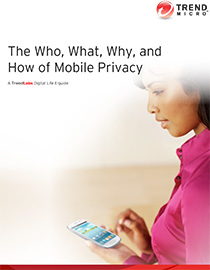Exercise Your Right to Mobile Privacy
 View guide: The Who, What, Why and How of Data Privacy
View guide: The Who, What, Why and How of Data Privacy
You have the right to remain private, even more so when you’re on your mobile device. Every time you use your smartphone or tablet to access the Internet or store information, you open yourself up to privacy risks. The things you post online, even your slightest activities on your device, can be seen, stolen, and used against you. It’s so easy to forget this fact when you’re already in the middle of your Angry Birds game or too engrossed in a long Snapchat exchange. The truth is a lot of people aren’t very mindful of mobile privacy.
In a Trend Micro survey, only 38% of respondents are conscious about limiting what they post online. The rest are not. Perhaps there’s this notion that since new smartphones and tablets are equipped with the latest security features, their owners are automatically safe from exposing too much. Unfortunately, these built-in features have their limits.
The personal data stored on your device can still be compromised through unsecure connections. Cybercriminals have been known to hijack Wi-Fi routers to spread malware and siphon off data from smartphones. The way you use your device can also jeopardize your mobile privacy. Simple things like your site visits and your app downloads may be exposing more information about you than you think. Ad libraries that often come with free mobile apps have been known to collect data from users without their knowledge.
Time and again, we see people’s privacy get violated when sensitive data gets leaked online. Compromising photos on a smartphone, for example, can be uploaded, causing damning repercussions to a person’s reputation. Devices without password protection, encryption, and data wiping options can become privacy hazards once they get lost or stolen. Whatever data is on the device is ripe for the picking.
So what can you do to protect your mobile privacy? Here are some quick tips:
- Enable your device’s security settings. Turning on your device’s built-in security features, like password protection, will serve as your first level of defense. Even if your device gets lost or stolen, it will make it harder for the bad guys to get to your data.
- Scrutinize apps before downloading them. With so many apps to choose from, it can be tricky to figure out the legitimate from the malicious. As a rule, only download apps from trusted sites. And before installing, it’s always best to check the permissions you’re granting your apps.
- Avoid oversharing. Do people really need to know your exact location every time you go out? Do you really want to send out risqué content to people you hardly know? Think very carefully before you share anything online. Posting something is easy, but taking it back is not.
Like it? Add this infographic to your site:
1. Click on the box below. 2. Press Ctrl+A to select all. 3. Press Ctrl+C to copy. 4. Paste the code into your page (Ctrl+V).
Image will appear the same size as you see above.
Recent Posts
- Estimating Future Risk Outbreaks at Scale in Real-World Deployments
- The Next Phase of Cybercrime: Agentic AI and the Shift to Autonomous Criminal Operations
- Reimagining Fraud Operations: The Rise of AI-Powered Scam Assembly Lines
- The Devil Reviews Xanthorox: A Criminal-Focused Analysis of the Latest Malicious LLM Offering
- AI Security Starts Here: The Essentials for Every Organization

 Complexity and Visibility Gaps in Power Automate
Complexity and Visibility Gaps in Power Automate AI Security Starts Here: The Essentials for Every Organization
AI Security Starts Here: The Essentials for Every Organization The AI-fication of Cyberthreats: Trend Micro Security Predictions for 2026
The AI-fication of Cyberthreats: Trend Micro Security Predictions for 2026 Stay Ahead of AI Threats: Secure LLM Applications With Trend Vision One
Stay Ahead of AI Threats: Secure LLM Applications With Trend Vision One